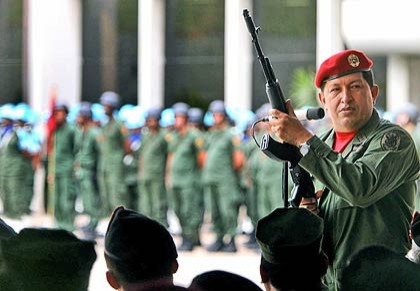Venezuela Bans Gun Sales Amid Rise In Violent Crime

The Venezuelan government passed a new gun law that prohibits the commercial sale of firearms and ammunition, moving the country closer to President Hugo Chavez and his administration's goal of disarming all civilians as crime rates continue to rise.
The new law will effectively end the sales of firearms and ammunition by private retailers. Only the army, police and certain exceptions such as security firms will be able to purchase weapons from a state-owned manufacturer or importer.
The ban has been touted as the government's latest initiative to improve public security and reduce crime in the runup to the presidential elections in October.
In 2010, Venezuela had one of the highest murder rates in the world, at 49 homicides per 100,000 people, according the country's Justice Minister, Tarek El Aissami.
In comparison, in the U.S. the murder rate in 2010 was 4.8 homicides per 100,000 people. In Mexico, a country marred by drug-related violence, the murder rate that same year was still only 14 homicides per 100,000 people. The global average stands at 6.9 homicides per 100,000 people.
Gun violence, in particular, has been identified as the predominant contributor to homicides in the region. Nearly 80 percent of all homicides committed in 2010 in South America involved firearms, according to a report by the U.N. Office on Drugs and Crime.
The role played by firearms in homicide is fundamental and, while the specific relationship between firearm availability and homicide is complex, it appears that a vicious circle connects firearm availability and higher homicide levels, the report read.
Firearms undoubtedly drive homicide increases in certain regions and where they do members of organized criminal groups are often those who pull the trigger.
The report states that countries in South America are particularly prone to violence as a result of drug-trafficking, especially in countries centered around illicit cocaine production, including Colombia, Peru, Bolivia and Venezuela.
Whilst the activities of drug trafficking organizations certainly play a significant role in Venezuela, the increase in homicide in this case may also be linked to other factors including general conventional crimes, the report added.
Earlier this year, the U.S. State Department issued a travel warning for Venezuela, highlighting the capital Caracas as a particularly dangerous place to travel.
In Caracas alone, 2,900 murders were reportedly committed between January and November 2011 ... [T]he vast majority of murders and other violent crimes go unsolved, the statement said. Armed criminal gangs often operate with impunity throughout the urban areas.
In March, Venezuelan President Hugo Chavez criticized the warning in a televised address and argued that his government was cracking down on crime, which was a problem inherited from the capitalist time, before he took office in 1999, the Associated Press reported.
Chavez also warned that his political opponents would attempt to incite violence leading up to the elections.
We're the guarantee of peace, he said.
Rising Crime And The Threat Of Civil Unrest
Chavez's critics have charged that the government and security forces do not have the capacity to implement the ban on commercial arms sales, citing rising crime rates and a failure to punish criminals.
The non-governmental organization, Venezuelan Violence Observatory, has said that violent crime has risen since Chavez came into office.
According to VVO figures, 4,550 homicides were committed in 1999, the first year of Chavez's presidency. By 2011, that number had risen to over 19,000.
In addition to the commercial gun sales ban, the Venezuelan government has pushed other public security initiatives. Last November, at the height of one of Venezuela's most violent years of crime yet, Chavez announced the formation of the People's Guard, a new paramilitary force with the purpose of increasing public security. Thousands were deployed to assist police in the streets of Caracas and other crime-prone areas of the country.
While it is clear that Venezuela has a serious crime problem, little has been mentioned about how Chavez's declining health could lead to civil unrest in the wake of rumors that his cancer is in its terminal stages.
The political situation in Venezuela could be severely destabilized by Chavez's death or incapacitation due to illness, and the government appears to be preparing for such a scenario.
Last month, Chavez formed a nine-member State Council to assist him with his executive duties, a strong indication that he is unable to keep up his signature autocratic method of governing.
This latest initiative against guns, while it legitimately appears to be an effort to reduce violent crime in an election year, may also serve a double purpose -- keeping physical power in the hands of the state shoud disorder ensue in the wake of a power vacuum situation.
© Copyright IBTimes 2024. All rights reserved.





















